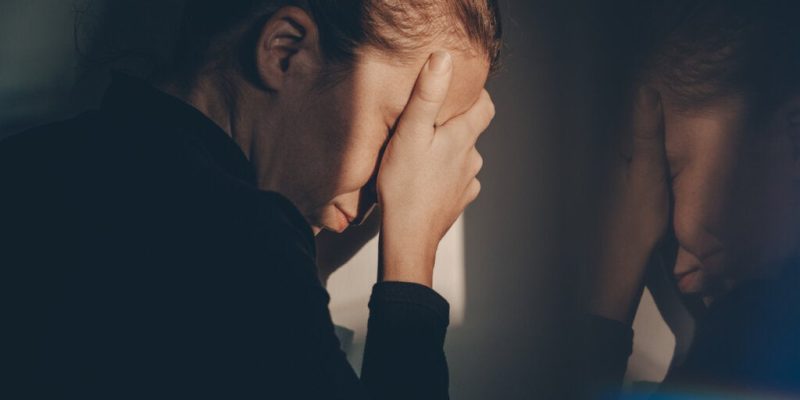We all suffer losses at certain points in our lives. In the face of these events, grief is the natural reaction. It allows us to process our emotions, integrate what’s happened, and move on. Even if we anticipate the pain, and know that, sooner or later, we’re going to experience it, this doesn’t diminish its intensity or relevance. It’s at these moments when we feel ourselves falling into the abyss of grief, that the presence and support of others can save us. Today, we want to discuss the relationship between grief and social support.
Losses take many forms. They can range from a love breakup to a job dismissal, from the death of a family member to a move or migration process. For each individual, the impact of these situations will be different. However, in all cases, the support network has a distinctive value.
The effects of grief
Loss (of any kind, but especially that related to the death of a loved one) triggers different internal processes that aren’t easy to deal with. On the one hand, it arouses many intense and negatively charged emotions. They can range from sadness and guilt to fear, anger, and hopelessness.
On the other hand, the mourner’s daily life is completely altered by the loss. For instance, their routines and dynamics must inevitably change. Moreover, they have to learn new ways of living and functioning without the person they’ve lost and all they contributed to their life. This ranges from their presence, company, and emotional support, to more practical and everyday aspects in which they helped or collaborated, which the grieving individual now realizes.
In addition, the bereaved person’s sense of belonging can be shaken, especially if the deceased was someone particularly close to them or if their identity was built around their relationship with them. For example, an older woman who loses her husband may feel that she’s no longer necessary or useful since she has no one to take care of. In addition, she feels extremely lonely.
The link between grief and social support
We all possess resilience that allows us to face all the processes of loss and move on. However, how we choose to approach our grief (especially in its early stages) is crucial to how difficult it’ll be. This is why the relationship between mourning and social support is so important.
Researchers have studied different styles of coping with loss. They’ve discovered that not all of them are equally effective or beneficial. In fact, people who are solution-focused, have social support, and manage their emotions well are those who experience the most positive personal growth and transformation and who grieve the least.
Social support is vital to face the suffering derived from loss. Mainly, because it allows the individual to carry out the important tasks of mourning.
Emotional expression
Emotions after a loss can be intense and overwhelming. They need to be properly processed and expressed. Having trustworthy people around, who offer a safe space for the individual to vent their emotions and who are capable of empathizing and validating them is extremely healing. If they don’t go through this process, their emotions can become entrenched and cause prolonged pain.
Adaptation to the environment without the loved one
The death of a loved one shakes the life of the bereaved completely. It forces them to change their routines, schedules, and dynamics. They might even find themselves having to take responsibility for themselves. This rearrangement isn’t easy. Therefore, having people around to support them on a practical and instrumental level can be a great relief. Indeed, if they’re forced to assume this extra burden alone, it adds to their emotional distress. Consequently, it’ll be really difficult for them to move on.
Sense of belonging
If the identity of the bereaved individual was tied to the deceased, they might feel really empty, confused, and disconnected. In effect, they no longer know who they are. The plans they’d had together are canceled, and they just don’t know where they fit in anymore.
This is when those close to them or even new relationships can be of great help. In effect, to a great extent, we define ourselves based on our ties. As such, having meaningful relationships helps the bereaved person feel that they still belong and that they’re part of something bigger.
Feeling of control
Lastly, social support allows the bereaved to regain a certain sense of control over their own lives, the kind that they feel has been taken away from them after their loss. In this regard, support groups appear to be particularly useful. In fact, by being part of them, the individual is taking control of their situation and dealing appropriately with their pain. Moreover, they’re also contributing to improving the well-being of other people in the group.

The benefits of social support after grief
Having the presence, support, and backing of other people during the grieving process is a huge protective factor. Even if, at times, we feel the tendency or the need to isolate ourselves, or we have no motivation to socialize and just want to lose ourselves in the memories of someone who’s no longer there, it’s important that we allow ourselves to be supported.
If you’ve suffered a significant loss, surround yourself with those trusted people with whom you can express your emotions. Those who’ll comfort, help, and support you. If you don’t have these kinds of people around you, consider the possibility of joining a support group or starting a therapeutic process. Remember that social support can save you from the abyss you now see in front of you.
The post Social Support After Grief: Being Saved From the Abyss appeared first on Exploring your mind.



















Comments